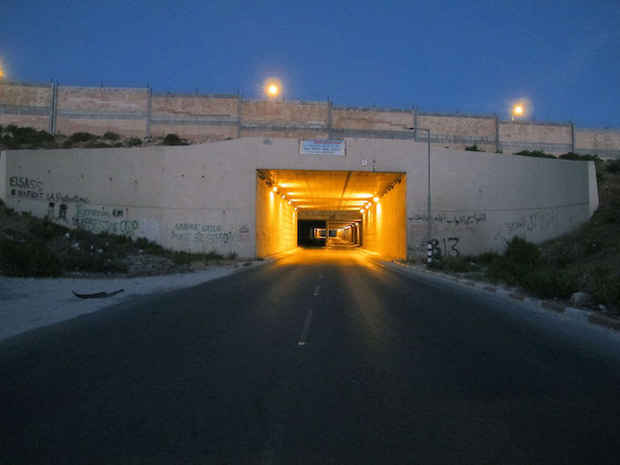“Omnipresence” Exhibition
The Kitchen

[Image: Detail of "Kissing Point" (2014) by Peggy Ahwesh - Courtesy of the artist and Microscope]
This event has ended.
Omnipresence explores the means by which authority is represented, understood, installed, and desired. In a moment enraptured by the caricatured return to power of right-wing populism and symptomatic erup- tions of violence repeated as media spectacle, the artworks in Omnipresence turn instead to the banal and the everyday: sidewalk construction walls, bright white LED street lamps, road closures in the Occu- pied West Bank, the communal gardens of Singapore. Far from neutral, these structures and practices preserve and support specific notions of life and economy, while colonizing, gentrifying, or confounding others.
This exhibition emerges from a reading of Franz Kafka’s 1929 novel The Castle, where a disappointingly unspectacular castle acts as an unreachable, and ultimately empty, center of power. An unofficial authority is instead expressed through impassable roads, the odd letters of faceless agents, a garbled telephone call, endless bureaucratic apparatus, and contradictory conversations. Authority is not a simple system of order and obedience, of dependency on a single respected individual in an elevated position. Rather, it is a distributed system asserted through infrastructure and the standardization of many aspects of life. In the words of Kafka, “Are there supervisory authorities? There are only supervising authorities.”
Omnipresence composes an incomplete international account of contemporary infrastructure, asserting the continued need to represent and encounter both emergent and persistent forms of authority. Rather than a totalizing network of control, the term omnipresence refers to the specific and immanent social practices and infrastructures naturalized as mundane elements of the everyday. It is here that a form of “slow violence” takes place—to follow the phrase of scholar Rob Nixon—transforming the structure of social life through the mechanisms of decentralized authority, to produce a new normal, where control becomes a lived environmental condition.
Omnipresence is curated by Elisa R. Linn, Joseph Lubitz, Ellen Pavey, and Manabu Yahagi, 2017–2018 Helena Rubinstein Curatorial Fellows in the Whitney Museum of American Art Independent Study Program (ISP), with the support of Kenneth White, Curatorial Studies Faculty at the Whitney ISP. The accompanying catalogue features essays by the curators and contributions by participating artists.
Michèle Graf and Selina Grüter present their performance One against All [Uno contro tutti] on May 29 at 6:30 pm in the Susan and John Hess Family Gallery and Theater at the Whitney Museum of American Art, 99 Gansevoort Street, New York.
Media
Schedule
from May 24, 2018 to June 16, 2018
Opening Reception on 2018-05-24 from 17:00 to 20:00